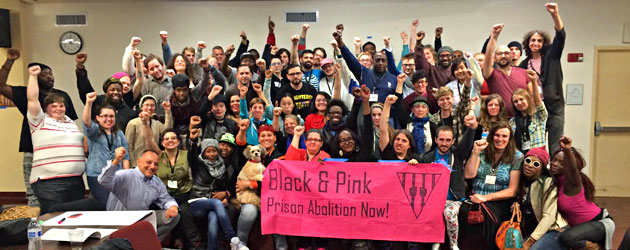
Formerly incarcerated LGBTQ folks from 18 different states joined Black and Pink to celebrate their 10th anniversary.
Photo: Jason Lydon
By: Sara Brown/TRT Assistant Editor—
BOSTON, Mass.—A Boston non-profit organization that supports LGBTQ prisoners’ rights recently celebrated their 10th anniversary.
Black and Pink is an open family of LGBTQ prisoners and “free world” allies who support each other. Their work toward the abolition of the prison industrial complex is rooted in the experience of current and formerly incarcerated people. According to the organization, they are “outraged” by the specific violence of the prison industrial complex against LGBTQ people, and respond through advocacy, education, direct service, and organizing.
“There are chapters of Black and Pink across the country,” National Director Rev. Jason M. Lydon said. “From the outside, we support people on the inside.” [pullquote]According to the organization, they are “outraged” by the specific violence of the prison industrial complex against LGBTQ people, and respond through advocacy, education, direct service, and organizing.[/pullquote]
The organization supports LGBTQ prisoners with various programs and services. One of them is an online pen pal program where LGBTQ prisoners can list their name, address, and 25-word (non-sexual) ad describing what they want from a pen pal.
They also have a monthly newsletter made up of stories, poetry, art, and essays by current and formerly incarcerated LGBTQ people. Currently, incarcerated inmates are encouraged to share their stories with Black and Pink. In turn, the organization adds the stories to the newsletter to nurture a sense of connection between incarcerated LGBTQ people around the country.
Lydon said the newsletter can mean a lot to some prisoners.
“It’s often the only piece of mail they get on the inside. It helps them feel connected,” he said.
However, the newsletter does more than just help people feel connected.
“It’s a way of organization. It gives people advice on how to fight back and demand for their rights,” Lydon said.
In late October, Black and Pink took some time to celebrate their accomplishments and decade of service over the course of a weekend. The weekend offered speeches from various former inmates such as CeCe McDonald, Bo Brown and Ashanti Allston. All speakers were former inmates because Black and Pink wanted to make sure all speakers were inmates at one point.
“Often, prisoners are spoken for and not allowed to speak for themselves,” Lydon said. “We think it is important that everyone knows the power of their voice and their story.”
Lydon said about 300 people were in attendance.
“The prison system creates trauma and violence,” Lydon said. “It’s important to do healing work and to prioritize that we did it together.”
Lastly, the organization focused on the movement toward abolition of the prison industrial complex and how it relates to the specific realities of LGBTQ people and Black and Pink’s role as they look to the future.
The celebration weekend also offered an opportunity for former prisoners to heal and to develop sharing skills. Overall, Lydon said the weekend was a “transformative” one.
“It was incredible,” he said. “It was touching and powerful.” [pullquote] Coming out of Concrete Closets seeks to offer a tool for organizers and advocates, both inside and outside of prisons, to strengthen national campaigns and grassroots efforts to alleviate the immediate suffering of prisoners and bring an end to the prison industrial complex while centering the needs of LGBTQ prisoners, according to Black and Pink.[/pullquote]
Black and Pink raised more than $1,400, over the course of the weekend.
They also released a telling report about life in prison called Coming out of Concrete Closets, a comprehensive analysis of the largest ever national survey of LGBTQ prisoners. According to Black and Pink, this collection of information is possible because of the time taken by 1,118 prisoners across the United States to handwrite responses to their 133-question survey. The report shows the violent nature of the prison system.
According to the report, three percent of transgender, non-binary gender, and Two‐Spirit respondents are currently taking hormones in prison, while an overwhelming 44 percent report being denied access to hormones. Respondents were four times more likely to be sexually assaulted than the general prison population.
Coming out of Concrete Closets seeks to offer a tool for organizers and advocates, both inside and outside of prisons, to strengthen national campaigns and grassroots efforts to alleviate the immediate suffering of prisoners and bring an end to the prison industrial complex while centering the needs of LGBTQ prisoners, according to Black and Pink.
One of the participants of the survey was Ashley Diamond who is on parole after spending three years in prison.
“As a prisoner who took the survey inside a prison, it was good to know that we were going to be heard,” Diamond told Mic News. “I took the survey and it was my way of being able to tell people about the horrors of what was actually happening to me. I encouraged all of the other LGBT inmates to do the same.”
Diamond also said she is one of the 59 percent of transgender inmates who reported sexual assault in the survey.
“If you don’t get uncomfortable with these findings, then there’s something wrong with us,” she added.
Moving forward, the organization wants to continue their work and help change the prison system.
“We want to see an end of solitary confinement. We want to see an end to strip searches,” Lydon said.
For more information, please visit www.blackandpink.org.







